初一下学期英语重点知识点归纳总结材料
七年级下册英语知识清单

七年级下册英语知识清单摘要:一、核心词汇1.国家名词2.与人相关的名词3.常见人称代词4.其他常用词二、重点语法1.一般现在时2.一般过去时3.一般将来时4.现在进行时三、句型结构1.疑问句2.否定句3.祈使句4.感叹句四、实用对话1.日常问候2.介绍自己3.询问他人4.表达喜好正文:七年级下册英语知识清单:助力你的英语学习一、核心词汇1.国家名词:在本单元中,我们学习到了四个国家的名词,分别是英国(UK)、加拿大(Canada)、美国(USA)和中国(China)。
2.与人相关的名词:本单元涉及到了学生(student)、小学生(pupil)、教师(teacher)、男孩(boy)、女孩(girl)和朋友(friend)等与人相关的名词。
3.常见人称代词:本单元重点学习了第三人称单数代词,包括她(she)和他(he)。
4.其他常用词:本单元还学习了一些其他常用词,如新(new)、今天(today)、一个(an)等。
二、重点语法1.一般现在时:一般现在时用于描述经常或习惯性的动作,如每天早上起床(I get up early every morning)。
2.一般过去时:一般过去时用于描述过去发生的动作,如昨天上学(I went to school yesterday)。
3.一般将来时:一般将来时用于描述将来发生的动作,如明天上课(I will have a class tomorrow)。
4.现在进行时:现在进行时用于描述现在正在进行的动作,如我现在正在写作业(I am doing my homework now)。
三、句型结构1.疑问句:本单元学习了如何提问,如询问姓名(What"s your name?)、年龄(How old are you?)等。
2.否定句:本单元学习了如何表达否定,如我没有兄弟姐妹(I don"t have any brothers or sisters)。
初一下学期英语重点知识点归纳总结学习资料

迟到
用法集萃
具体时间点 在几点(几分)
吃早饭/午饭/晚饭
基数词 ……点半
基数词 差一刻到……点
名词 从事……活动
从……到……
需要做某事
典句必背
I usually get up at six thirty.
1)用长度单位表示:It is five kilometers.
2)用时间表示:It’s twenty minutes’ walk.
用来提问时间,意为多久回答常用“for+段时”。
soon 用来提问做完某事还需要多长时间, 常用于将来时态时, 常用“in+时间段”
表示交通工具的名词,乘……去某地,是动词短语,在句中作谓语。
主语省略(无主语):Don’t arrive late for class.
:We can’t arrive ;ate for class.
在学校我们必须穿校服:We have to wear uniforms at school.
/必须做某事:have to do sth
don’t have to do sth
活动,比赛
说某种语言:speak+语言
、play+球、棋、牌;play+the+乐器。
、擅长于(做)什么:be good at +名词/动ing
、帮助某人做某事:help sb. (to ) do sth. help sb. with sth.
、我能知道你名字吗?May I know your name?
初一英语下册知识点归纳与总结

初一英语下册知识点归纳与总结(一)what does he look like询问人长什么样,回答:①主语+be+形容词/ 介词短语(he is tall/ of medium height);②主语+have/has+形容词+名词(she has long hair) what does sb like询问某人喜欢什么2,多个形容词修饰名词多个形容词修饰名词,一般关系近的靠近名词;音节少的在前,音节多的在后。
限定词+数词(序前基后)+描绘性形容词+大小、长短、高低+新旧+颜色+国籍+材料+名词3,May be 为情态动词+动词原形,在句子中做谓语,maybe是副词,表示可能,大概,一般放在句首。
4,a little,little修饰不可数名词,a little表示一点点,little表示几乎没有a few,few修饰可数名词,a few表示一点点,few表示几乎没有5, Find 强调找到的结果,look for 强调寻找的过程.6,问职业:what do you do=what is your job7,the same asbe different8,long straight brown hair9,最后in the end(表事情结局)finally(强调次序)at last(强调经多番努力终于达成)By the end of 直到为止At the end of在末端/尽头(二)1,名词可分为可数名词和不可数名词(不可数名词作主语,谓语动词用单数)。
可数名词又分单数和复数。
1一般+s;2以-s,-x,-ch,sh结尾的名词+es;3辅音+y,把y变i,再+es;4以-o结尾的,有生命的+es(negronegroes;heroheroes;tomatotomatoes;potatopotat oes);无生命的+s;⑤以f,fe 结尾的名词,改f,fe为v+es(leafleaves;knifeknives)(例外:roofs,chiefs)⑥单复数同形:sheep,deer.不规则变化:manmen;womanwomen;childchildren;footfeet;toothteeth等2,would like sth. 想要某物Would you like some 你想要一些吗 Yes, please./ No, thanks.would like to do sth. 想要做某事。
初一英语知识点总结归纳(汇总)

初一英语知识点总结归纳(汇总)一、词汇和短语初一英语的重点是建立基本的英语词汇量和短语知识。
以下是初一英语中一些常见的词汇和短语:•greet: v. 问候•introduce: v. 介绍•classmate: n. 同班同学•miss: n. 小姐;v. 想念•homework: n. 作业•schoolbag: n. 书包•school uniform: n. 校服•play basketball: 打篮球•listen to music: 听音乐•read books: 读书•watch TV: 看电视•favorite: adj. 最喜爱的•hobby: n. 爱好•on weekends: 在周末•famous: adj. 著名的二、语法初一英语期间将主要关注建立基本的语法知识。
以下是初一英语中的一些常见的语法知识:1.时态在初一英语中,学生需要了解并掌握常见的时态,包括:•现在时态–表示现在的状态或行为–eg. He usually plays basketball after school•过去时态–表示过去发生的行为或状态–eg. I watched TV last night•将来时态–表示将要发生的行为或状态–eg. I am going to have a biology class tomorrow2.代词初一英语中,学生需要了解并掌握常见的代词,例如:•人称代词–主格:I, you, he, she, it, we, they–宾格:me, you, him, her, it, us, them–eg. He wants to go to the movies with me.•物主代词–形容词性:my, your, his, her, its, our, their–名词性:mine, yours, his, hers, its, ours, theirs–eg. This book is mine, not yours.3.句型初一英语中,学生需要了解并掌握常见的句型,例如:•肯定句型–主语+谓语+宾语–eg. They play basketball together every day.•否定句型–主语+do/does/did+not+谓语–eg. He does not like to eat vegetables.•一般疑问句型–Do/Does/Did+主语+谓语–eg. Do you often watch TV on weekends?•特殊疑问句型–以疑问词(what, who, when, where, why, how)开头+主语+谓语–eg. What do you do on weekends?三、阅读理解学生在初一英语阅读方面,需掌握基本的读写能力,着重于理解和记忆词汇。
初一下册英语重点知识点归纳

初一下册英语重点知识点归纳初一下册英语重点知识点归纳在我们的学习时代,很多人都经常追着老师们要知识点吧,知识点就是掌握某个问题/知识的学习要点。
掌握知识点是我们提高成绩的关键!以下是店铺帮大家整理的初一下册英语重点知识点归纳,希望对大家有所帮助。
初一下册英语重点知识点归纳篇1一、look for/ findlook for 意为"寻找",而find意为"找到,发现",前者强调"找"这一动作,并不注重"找"的结果,而后者则强调"找"的结果。
例如:She can't find her ruler. 她找不到她的尺子啦。
Tom is looking for his watch,but he can't find it.汤姆正在寻找他的手表,但没能找到。
二、 be sleeping/ be asleepbe sleeping 表示动作,意思是"正在睡觉";be asleep 表示状态,意思是"睡着了"。
如:---What are the children doing in the room? 孩子们在房间里做什么?---They are sleeping.他们正在睡觉。
The children are asleep now.现在孩子们睡着了。
三、 often/ usually/sometimesoften表示"经常",sometimes表示"有时候",在表示发生频率上often要高于usually,usually要高于sometimes。
这三个词表示的是经常性,一般性的动作或情况,常与一般现在时连用,常位于主要谓语动词的前面,其他谓语动词(be动词,情态动词和助动词)的后面,有时也可位于句尾。
如果要加强语气,则放在句首。
人教版七年级英语下册单元知识点总结(全册)

人教版七年级英语下册单元知识点总结(全册)Unit 1 Can you play the guitar?一短语归纳1.speak English/Chinese 说英语/汉语2. what club /sports什么俱乐部/运动3.play the guitar/ piano/drums/ violin 弹吉它/弹钢琴/敲鼓/拉小提琴4. play chess/ basketball/ volleyball/ soccer 下国际象棋/ 打篮球/排球/足球5.tell stories讲故6. the art/chess/swimming/sports/ story telling/English club艺术/国际象棋/游泳/体育/讲故事/英语俱乐部7.school show 学校演出8.sound good听起来不错9.teach music 教音乐10.do kung fu练(中国) 功夫11.make friends(with sb.)(结交朋友)12.on the weekend/on weekends在周末e and show us来给我们表演15.write stories写故事16.after school放学后17.English-speaking students说英语的学生18.play games 做游戏19.the Students’ Sports Center学生运动中心20.at the old people’s home在老人之家21.be in our school music festival 参加学校音乐节22.jion the music club加入音乐俱乐部二用法集萃1. play +棋类/球类下……棋,打……球2. play the +乐器弹/拉……乐器3. be good at doing sth.擅长做某事be good for.. 对… 有好处be good /kind to … 对… 友好4. be good with sb. 和某人相处地好; 善于应付(处理)…5. need(sb./sth.)to do… 需要(某人/某物)做….6. can + 动词原形能/会做某事7. a little + 不可数名词: 一点儿……9. like to do sth.或like doing sth. 喜欢做某事10.want to do…想做……11.What about…?…怎么样?(后面接Ving/代词/名词)12. talk用法: talk to/with sb. 跟某人说话talk about sth. 谈论某事tell 用法:tell sb sth. 告诉某人某事tell sb to do sth 告诉某人去做某事tell stories 讲故事say用法:say直接加说话的内容/itspeak用法:speak +语言13.help sb. with sth在某方面帮助某人= help sb.(to)do sth14.be free /busy有空/很忙15. call sb. at+号码拨打某人的……号码16. be in=join …成为…中的一员(P6)17.want …for the school show为学校表演招聘……三典句必背1. Can you draw? 你会画画吗?Yes, I can. / No, I can’t.是,我会。
七年级英语重点下册知识点归纳

七年级英语重点下册知识点归纳七年级英语重点下册知识点交际用语1. Why do you like pandas? 你为什么喜欢熊猫? Because they’re veryclever.因为他们非常聪明。
2. Why does he like koalas? 你为什么喜欢考拉?Because they’re kind of interesting.因为他们有点有趣3. Where are lions from? 狮子来自哪里?They are from South Africa. 他们来自南非。
4. What other animals do you like? I like dogs, too. Why?你喜欢其他的什么动物?我也喜欢狗,为什么?Because they’re friendly and clever. 因为他们友好,聪明。
5. Molly likes to play with her friends and eat grass.莫莉喜欢和她的朋友一起玩,吃草。
6. She’s very shy. 她非常害羞。
7. He is from Australia. 他来自澳大利亚。
8.He sleeps during the day, but at night he gets up and eatsleaves.他白天睡觉,但是晚上他会起来吃叶子。
9.He usually sleeps and relaxes 20 hours every day.他通常每天睡觉休息20个小时。
10.Let’s see the pandas first. 让我们先看熊猫。
11.Why do you wantto see the lions?你为什么想去看狮子七年级英语重点下册知识点总结一. 动词be(is,am,are)的用法我(I)用am, 你(you)用are,is跟着他(he)、她(she)、它(it)。
初一下册英语知识点汇总

初一下册英语知识点汇总一、语法知识点1. 现在进行时:描述正在进行的动作或状态,使用时用be动词加动词-ing形式。
例:I am reading a book.(我正在读一本书。
)2. 一般现在时:表示经常性或普遍性的动作或状态。
例:She goes to school every day.(她每天上学。
)3. 一般过去时:表示过去发生的动作或状态。
例:They visited their grandparents last week.(他们上周去看望了他们的祖父母。
)4. 一般将来时:表示将要发生的动作或状态。
例:We will have a party tomorrow.(我们明天要开一个派对。
)二、词汇知识点1. 问候语:用于问候和打招呼的常用表达。
例:Hello!(你好!)Nice to meet you!(很高兴见到你!)2. 数字:用于表示数量或顺序的数字词汇。
例:one(一), two(二), three(三), first(第一), second (第二), third(第三)3. 学科词汇:常用于描述科目和研究相关的单词。
例:math(数学), science(科学), geography(地理), history(历史)4. 动词:常用动作动词和状态动词。
例:run(跑), eat(吃), sleep(睡觉), happy(快乐)三、阅读技巧1. 理解词义:通过上下文推测词义,遇到生词时可以使用词根或词缀分析词义。
2. 关键词定位:快速浏览文章,找到与问题相关的关键词,通过定位关键词来找到答案。
3. 推理推断:从已有信息中推断答案,根据事实进行逻辑推理。
4. 主旨概括:准确理解文章的主旨,通过理解文章大意来回答问题。
四、听力技巧1. 注意听力材料:集中注意力,注意材料中的关键词和信息。
2. 笔记记录:听力过程中可以适当做笔记,帮助记忆和理解。
3. 推断答案:通过听到的信息和已有知识推断答案。
- 1、下载文档前请自行甄别文档内容的完整性,平台不提供额外的编辑、内容补充、找答案等附加服务。
- 2、"仅部分预览"的文档,不可在线预览部分如存在完整性等问题,可反馈申请退款(可完整预览的文档不适用该条件!)。
- 3、如文档侵犯您的权益,请联系客服反馈,我们会尽快为您处理(人工客服工作时间:9:00-18:30)。
Unit 1◆短语归纳1. play chess 下国际象棋2. play the guitar 弹吉他3. speak English 说英语4. English club 英语俱乐部5. talk to 跟…说6. play the violin 拉小提琴7. play the piano 弹钢琴8. play the drums 敲鼓9. make friends 结交朋友10. do kung fu 练 (中国) 功夫11. tell stories 讲故事12. play games 做游戏13. on the weekend/on weekends 在周末◆用法集萃1. play +棋类/球类下……棋,打……球2. play the +西洋乐器弹/拉……乐器3. be good at doing sth.= do well in doing sth. 擅长做某事4. be good with sb. 和某人相处地好5. need sb. to do sth. 需要某人做某事6. can + 动词原形能/会做某事7. a little + 不可数名词一点儿……8. join the …club 加入…俱乐部9. like to do sth. =love to do sth. 喜欢/喜爱做某事◆典句必背1. Can you draw? Yes, I can. / No, I can’t.2. What club do you want to join? I want to join the chess club.3. You can join the English club.4. Sounds good./That sounds good.5. I can speak English and I can also play soccer.6. Please call Mrs. Miller at 555-3721.◆话题写作Dear Sir,I want to join your organization (组织) to help kids with sports, music and English. My name is Mike. I am 15 years old. I’m a student in No. 1 Middle school.I can play the guitar well. I can sing many songs. I can swim and speak English well, too. I think I can be good with the kids. I also do well in telling stories.I hope to get your letter soon.Yours,Mike◆语法讲解1.can+动词原形,它不随主语和数而变化。
(1)含有can的肯定句:主语+can+谓语动词的原形+其他。
(2)变一般疑问句时,把can提前:Can+主语+动词原形+其他?肯定回答:Yes,主语+can。
否定回答:No,主语+can't.(3)含有can的否定句:主语+can't+动词的原形+其他。
(4)含有can的特殊疑问句:特殊疑问词+can+主语+动词原形+其他?2. may+动词的原形。
(may为情态动词)一般疑问句是把may提前,肯定回答是:Yes,主语 +may。
否定回答是:No,主语+mustn't。
或please don't。
join+某个组织,俱乐部,party,参军,党派等“加入”Join sb. “参加到某人中” join in (doing)sth “加入做......,参加某个活动” Join in=take part in +活动,比赛3. 说某种语言:speak+语言4、play+球、棋、牌;play+the+乐器。
5、擅长于(做)什么:be good at +名词/动ing6、帮助某人做某事:help sb. (to ) do sth. help sb. with sth.7、我能知道你名字吗?May I know your name?8、想要做什么:want to do sth 例如:I want to learn about art.9、What club do you want to join?I want to join the chess club and the basketball club.10、What club does Tom want to join? He wants to join the swimming club .11、He can’t play the violin or the piano. Can you help kids with swimming?12、Why do you want to join the English club? Because I want to learn English well.Unit 2◆短语归纳1. what time 几点2. go to school 去上学3. get up 起床4. take a shower 洗淋浴5. brush teeth 刷牙6. get to 到达7. do homework 做家庭作业8. go to work 去上班9. go home 回家10. eat breakfast 吃早饭11. get dressed 穿上衣服12. get home 到家13. either…or…要么…要么…14. go to bed 上床睡觉15. in the morning/ afternoon/ evening 在上午/下午/晚上16. take a walk 散步17. lots of=a lot of 许多,大量18. radio station 广播电台19. at night 在晚上20. be late for=arrive late for 迟到◆用法集萃1. at + 具体时间点在几点(几分)2. eat breakfast/ lunch/dinner 吃早饭/午饭/晚饭3. thirty\half past +基数词……点半4. fifteen\a quarter to +基数词差一刻到……点5. take a/an +名词从事……活动6. from …to …从……到……7. need to do sth 需要做某事◆典句必背1. What time do you usually get up? I usually get up at six thirty.2. That’s a funny time for breakfast.3. When do students usually eat dinner? They usually eat dinner at a quarter to seven in the evening.4. In the evening, I either watch TV or play computer games.5. At twelve, she eats lots of fruit and vegetables for lunch..6. She knows it’s not good for her, but it tastes good.7. Here are your clothes.◆话题写作主题:谈论日常作息习惯My School DayI am a student. I usually get up at seven, and I eat breakfast at seven thirty. Then I go to school at eight. School starts at eight thirty. I eat lunch at twelve.I go home at 17:00. I often eat dinner at 19:00 and then play the piano. I do my homework at 20:00. At 22:00, I go to bed.◆语法讲解1.what time和when引导的特殊疑问句。
(1)对时间提问用what time,也可以用when。
询问钟点时用what time,询问日期、月份、年份时用when。
(2)询问做某事的时间时,两者可以互换。
(3)其他询问时间的句子:What's the time? =What time is it?现在几点了?时刻表达法:顺读法和逆读法。
(1)顺读法:“钟点+分钟”直接读数字。
(2)逆读法:借助介词past或to表示,要先说分再说钟点。
A.当分钟不超过30分钟时(包括30分钟),即<或=30,用past表示。
其结构为:“分钟+past+整点”意为“几点过几分”。
B.当超过30分钟时,即>30,用to表示。
其结构为:“所差分钟(即60—所过分钟数)+to+下一个整点”,to译成“差”,差几分钟到几点。
C.当分钟为30分钟用half表示,当分钟为15分钟用a quarter。
2. always 总是>usually 通常>often常常>sometime 有时3. Watch+TV、球赛“观看,观赏”,特指长时间注视。
See+电影、医生“看见”,强调看的结果。
Look “看”,强调看的动作,look后接宾语时要用介词at。
Read+书刊、杂志“阅读”4. listen to +宾语5. Go to +地点名词如:go to school go+地点副词如:go home6、Take a shower “淋浴”7、Eat breakfast 吃早餐Unit 3◆短语归纳1. get to school 到达学校2. take the subway 乘地铁3. ride a bike 骑自行车4. how far 多远5. from home to school 从家到学校6. every day 每天7. take the bus 乘公共汽车8. by bike 骑自行车9. bus stop 公共汽车站10. think of 认为11. between … and …在…和…之间12. one 11-year-old boy 一个11岁的男孩13. play with …和…玩14. come true 实现15. have to 不得不◆用法集萃1. take… to …= go to … by…乘…去…2. How do / does (sb)get to …? …是怎样到…的?3. How far is it from … to …? 从…到…有多远?4. It takes sb. some time to do sth. 做某事花费某人多长时间。
